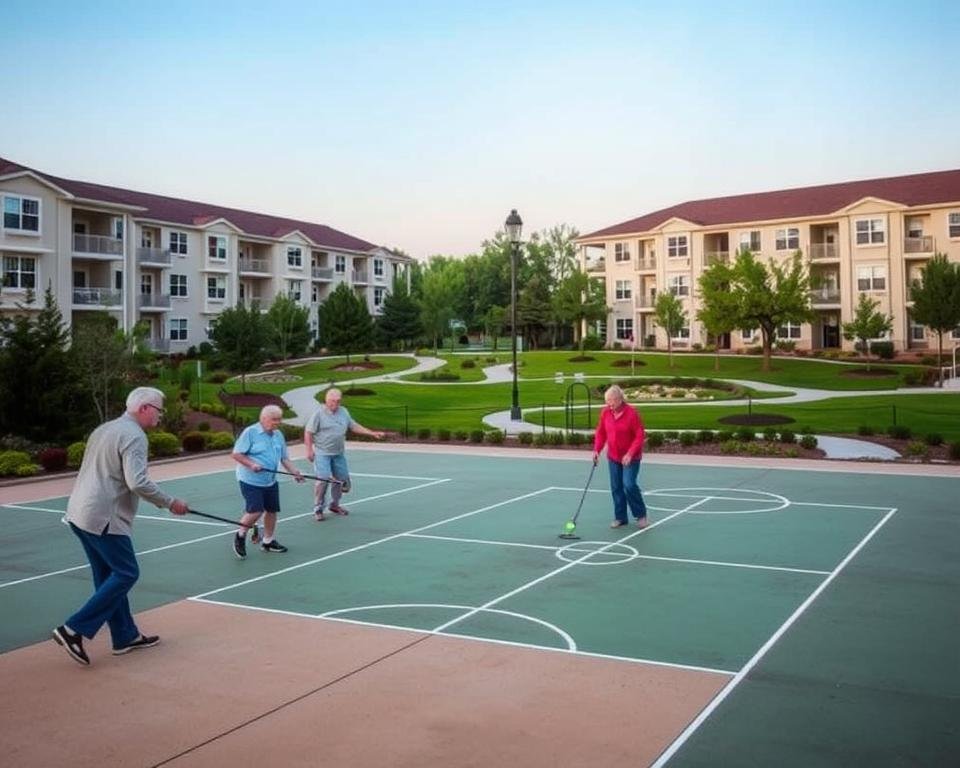“The future depends on what you do today.” – Mahatma Gandhi. This wisdom highlights the necessity of preparing for the future, especially regarding senior housing finances. As more Americans enter their golden years, finding affordable living arrangements becomes crucial. It’s vital to craft a budgeting plan for senior housing that maintains both comfort and high-quality care.
Variations in housing types, their costs, and unexpected expenses all play a role in financial planning. Whether your sights are set on independent living, assisted living, or skilled care facilities, early and informed planning is key. It allows you to uphold a desirable standard of living within your financial means. For detailed budgeting strategies, check out this guide on financial planning for elderly.
A sound grasp of cost-influencing factors and strategic budget management will lead you through this process smoothly. By tackling this with determination, you ensure both tranquility and financial security in your later years.
Key Takeaways
- Effective budgeting is crucial for senior housing.
- Explore various housing options based on your needs.
- Understand hidden expenses that can arise.
- Evaluate your financial situation carefully.
- Set a realistic budget that includes flexibility.
- Utilize community resources to maximize your savings.
- Consider seeking professional guidance for complex decisions.
Understanding Senior Housing Costs
Exploring senior housing options requires a clear grasp of the costs involved for effective financial planning. You have choices like low-income apartments, assisted living, and retirement communities. Each offers distinct benefits and varying costs, impacting your financial planning.
Different Types of Senior Housing Options
Different senior housing types each have their own cost structure. Consider these options:
- Low-Income Apartments
- HUD Housing Programs
- Assisted Living Facilities
- Adult Foster Care Homes
Key Factors Influencing Costs
It’s vital to know what affects senior housing pricing for effective cost management. Here are factors that impact costs:
- Market Demand: Rising senior housing needs can increase prices.
- Location: Costs are often higher in urban areas.
- Services and Amenities: Add-ons like meals and healthcare raise expenses.
Many seniors spend over 30% of their income on housing, highlighting the need for careful budgeting.
Hidden Expenses You Need to Consider
Don’t miss potential hidden costs in your budget. Keep these factors in mind:
- Maintenance Fees
- Utility Bills
- Emergency Medical Expenses
These expenses can quickly impact your budget significantly. To better manage these, refer to this guide on senior housing expenses.

Assessing Your Financial Situation
Before diving into financial planning for elderly housing, closely examine your current financial status. Look at your income, savings, and potential financial aid. This assessment is crucial for developing your budget strategy for senior care. It enables effective fund management and allocation.
Evaluating Your Income and Savings
Start by listing all your income sources, such as pensions, Social Security benefits, and any earnings from part-time work. Also, tally your savings, investments, and other assets. Understanding your total resources is key to managing expenses related to senior housing.
Understanding Available Financial Aid
Many seniors might be eligible for different financial assistance programs. Explore options like Medicaid, long-term care insurance, and aid from local government programs. Investigating these can lessen the financial strain, underlining the importance of thoroughly examining all available help.
Creating a Snapshot of Your Expenses
Collect data on your usual expenses, from medical expenses to daily living costs like groceries and transportation. Detailing your monthly outgoings helps pinpoint what you can spend on housing. Keeping a vigilant track of your spending is crucial for effective financial planning in eldercare.

Setting a Realistic Budget for Senior Housing
To successfully navigate your senior housing options, it’s vital to create a realistic budget. This requires a thorough understanding of both your income and expenses. It’s about finding balance between your essential needs and the unexpected costs that may arise. By adopting a solid budgeting approach, you can make informed decisions about your living situation, leading to smarter choices.
Guidelines for Monthly Housing Costs
Start by examining your total monthly income to decide how much you can afford for housing. Experts typically advise that housing costs shouldn’t surpass 30% of your gross income. Sticking to this guideline helps you locate senior living options that are within your financial reach.
Prioritizing Your Essential Needs
When budgeting for senior housing, it’s crucial to prioritize your essential expenses. Key areas to focus on include:
- Housing costs, including rent or mortgage
- Healthcare expenses, ensuring you can meet medical needs
- Groceries and other daily living essentials
Allocating funds wisely towards these areas will help in crafting a balanced financial plan.
Incorporating Flexibility for Unexpected Costs
Life’s unpredictability, especially regarding finances, requires a budget that allows for flexibility. It’s smart to have an emergency fund to tackle unforeseen expenses. This preparedness enables you to maintain financial stability, making your budgeting efforts for affordable senior living more robust and effective.

Researching Your Options
Conducting thorough research is critical when searching for the right senior housing. Insights into local options that fit your needs and budget are essential. A knowledgeable approach aids in managing retirement community costs effectively. It also unveils affordable senior living alternatives.
Exploring Local Housing Alternatives
Discovering different senior housing types in your vicinity widens your choices. Look into independent living, assisted living, or memory care facilities based on required support levels. Online community showcases allow for easy comparison. This step is crucial for planning senior housing expenses, aligning your environment and lifestyle preferences.
The Importance of Visiting Potential Homes
Physically visiting potential homes offers a real sense of their ambiance and facilities. Interacting with staff and residents gives insight into the community’s character. This visitation helps in understanding your options better and uncovering any hidden expenses. It solidifies your choices for budget-conscious senior living.
Comparing Amenities and Services
When reviewing housing options, examine the amenities and services closely. Some communities provide extra services that could enhance your quality of life, which might come at an additional cost. Balance these benefits against the monthly fees to manage expectations and budget. A thorough senior housing expenses planning considers these elements in your financial plan.
Making the Most of Your Budget
Managing senior housing costs effectively can drastically alter your financial landscape. Adopting creative strategies and planning ahead are key. We aim to share practical tips for budgeting in affordable senior living. The goal is to improve your financial standing without compromising on care quality.
Cost-Saving Tips for Senior Housing
Seeking out senior discounts can yield significant savings. Many services and local businesses have special offers for older adults. It’s worth exploring:
- Discounts on public transportation or rideshare services
- Reduced fees for local attractions or community classes
- Special pricing on grocery store memberships
Leveraging Community Resources and Programs
Communities often have resources to support seniors with daily costs. Numerous non-profits and organizations aim to assist older adults. These programs can significantly bolster your budgeting strategy. You should consider:
- Food assistance or meal delivery services
- Community centers that offer free or low-cost activities
- Local health services with affordable check-ups
Adjusting Your Lifestyle to Fit Your Budget
Making even minor lifestyle adjustments can make a big impact on your budget. It’s vital to review your habits and see where you can make changes. Focus on areas such as:
- Transportation options, possibly using public transit over owning a car
- Shopping habits, choosing budget-friendly grocery options
- Energy consumption, aiming for efficiency in your home
For detailed financial planning advice related to senior housing, this comprehensive resource can be quite helpful.
Planning for Future Changes
Entering your retirement years demands attentive long-term financial planning for elderly housing. You must consider future financial and healthcare changes. By applying retirement community cost-saving strategies, you ensure your housing needs are met throughout your later years.
Anticipating Financial Shifts
Retirement introduces various financial shifts impacting senior housing budgeting. Social Security income changes, investment fluctuations, or unexpected costs can reshape your finances. Monitoring your budget allows for timely adjustments to your cost-saving strategies, keeping housing expenses within reach.
Preparing for Health Care Needs
As you age, your health care needs are likely to change, requiring careful planning. Additional services might become necessary, influencing your elderly housing financial strategy. Exploring community options, such as in-home care and assisted living facilities, helps predict future expenses for integration into your budget.
Reviewing Your Housing Decision Periodically
Your housing should match your current needs and finances. Regularly reevaluating your housing choices is important. This involves measuring your living situation against personal and financial objectives. Such reviews ensure your senior housing costs remain aligned with your needs, offering flexibility for unforeseen changes or opportunities.
Seeking Professional Guidance
Embarking on the journey to find ideal senior housing combines quality with affordability. Consulting a professional can significantly impact this process. Knowing the right time to seek advice ensures your financial planning for elderly housing is effective. A financial advisor can review your finances, offering insights on allocating budget for senior housing.
This helps in pinpointing options that align with your financial situation.
When to Consult a Financial Advisor
Meeting a financial advisor becomes crucial when financial situations get complex. This step is also vital when seeking tailored advice on managing budgets. They craft a detailed plan that covers housing costs while planning for future needs and shifts. This advisement aids in navigating the complex world of senior living budgeting.
It enriches your confidence in making informed decisions.
Choosing the Right Senior Housing Consultant
Selecting an apt senior housing consultant is essential. Aim for someone with rich experience and thorough market knowledge. The ideal consultant aligns your options with your financial plan. This ensures your chosen housing meets your lifestyle needs within your budget.
Their expertise boosts your confidence during this crucial phase.
Utilizing Online Resources and Tools
The internet is a treasure trove of valuable information. It offers tools and platforms for comparing costs and exploring housing models. These tools, alongside insights into budgetary planning, simplify the search for affordable senior living.
Combining professional advice and online tools clarifies and enhances your housing decision-making process.
